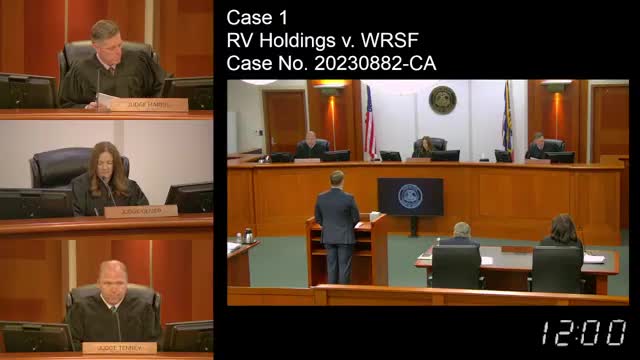Utah Court of Appeals hears challenge to arbitrator’s award after 2014 oral agreement came up at hearing
Get AI-powered insights, summaries, and transcripts
Subscribe
Summary
The Utah Court of Appeals heard oral argument in RV Holdings 4 v. WRSF Investment (case no. 20230882) about whether an arbitrator exceeded her authority by awarding damages tied to an alleged 2014 oral management agreement that the appellant says was never submitted or properly noticed in arbitration.
The Utah Court of Appeals heard oral argument in RV Holdings 4 v. WRSF Investment (case no. 20230882) about whether an arbitrator exceeded her authority by awarding damages tied to an alleged 2014 oral management agreement that the appellant says was not submitted or properly noticed in arbitration.
Christopher Bates, counsel for the appellant, told the three-judge panel that Ridgeview Capital (the appellee in the appeal) "made a tactical decision not to bring a claim for breach of a 2014 oral agreement" and instead pressed a claim under a 02/2006 agreement. Bates said the arbitrator ultimately awarded relief based on the 2014 agreement even though, he said, Ridgeview had denied that agreement existed and did not present evidence or a claim on that theory in its arbitration filings.
Why the court is watching: If the appellate court agrees with the appellant, it could narrow the circumstances in which courts will modify or vacate arbitration awards on the ground that an award was entered on a claim that was not submitted. Appellant counsel argued the Utah Arbitration Act and the parties’ incorporation of JAMS rules create a statutory and contractual limit on what arbitrators may award when a party never put a claim or the required JAMS notice before the tribunal.
Appellees’ counsel, Jefferson Gross, argued the arbitrator had broad remedial authority under the parties’ arbitration agreement and JAMS rules. Gross pointed the panel to JAMS Rule 24C and said the arbitrator "may grant any remedy or relief that is just and equitable and within the scope of the party's agreement, including but not limited to specific performance of a contract or any other equitable relief." Gross and other appellee counsel also emphasized deference to arbitrators and argued that many facts relevant to the award were presented and litigated during a multi-day arbitration hearing.
The panel’s questioning focused on two related issues: (1) what the statutory standard of review is when an appellate court considers whether an arbitrator exceeded authority and (2) the meaning of "claim" for purposes of the modification/vacatur provisions in the Utah statute and the JAMS notice rules. Judge Tenney asked whether the court must use a narrow or broad aperture in defining "claim," noting that the arbitration centered on management-fee disputes and asking whether that subject-matter framing meant any damages tied to management fees were necessarily submitted. Judge Harris pressed whether the procedural posture (timing of filings and whether evidence was introduced) could make the 2014 theory tried by consent.
Counsel for the appellant said the arbitrator also violated JAMS notice provisions (citing JAMS Rule 9A and Rule 11A as incorporated by the parties) by awarding relief on a theory for which appellant contends it had no timely notice and therefore no chance to present targeted evidence or argument. Appellee counsel replied that the parties had a wide agreement to arbitrate equitable remedies and that Utah law and JAMS give arbitrators latitude to resolve disputed management-fee claims on the evidence presented.
No ruling was issued from the bench. The panel told counsel it would take the case under advisement and issue a written decision as soon as practicable. The oral argument record shows repeated references to precedent (Grimmer; Allstate; Duke; Pacific Development) and to out-of-state decisions the parties have cited on the question whether an arbitrator can award on a claim that was not formally presented or noticed.
Background and specifics from the hearing: counsel for the appellant said the dispute encompassed competing theories about whether a 02/2006 written management agreement continued in force or whether later arrangements (described in the record as 2011, 2013 and 2014 iterations) governed payments. Appellant counsel said Ridgeview had sought large management-fee awards under the 02/2006 theory, while the arbitrator ultimately credited terms the panel described as derived from an asserted 2014 oral agreement. Appellant counsel said Ridgeview had sought roughly $300,000 per year under continuing payments at one point in the record and (according to argument) had at times claimed up to about $500,000 a year under other theories; those numbers were cited in argument for context rather than as adjudicated factual findings on appeal.
What remains contested on appeal: the parties asked the court to decide whether (1) the arbitrator issued an award on a claim not submitted and therefore the award must be modified or vacated under Utah statutory provisions, and (2) whether any such error could instead be remedied by a narrow modification of the award. Appellant urged modification or vacatur; appellee urged deference to the arbitrator and emphasized equitable powers under JAMS and Utah law.
The court did not set a briefing or ruling schedule on the record at argument; it said only that it would take the matter under advisement and issue its ruling in due course.
